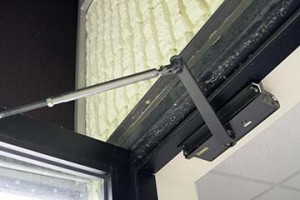 In the world of hardware, wind can be our biggest enemy. So much so, we even have to go as far as to have windstorm-rated hardware to be certain hardware can withstand heavy winds. Door closers are often a casualty of heavy winds. Slamming doors are usually a product of heavy winds and, really, I can’t think of anything more annoying in a store.
In the world of hardware, wind can be our biggest enemy. So much so, we even have to go as far as to have windstorm-rated hardware to be certain hardware can withstand heavy winds. Door closers are often a casualty of heavy winds. Slamming doors are usually a product of heavy winds and, really, I can’t think of anything more annoying in a store.
Last week, Ian Greene was my co-host on the video newsletter and we talked about door closers and the problems that can come along with them. (You can subscribe here!) However, I thought it might be worth it to go into a little more detail in today’s post.
Door Closers: Problems
Many people aren’t aware of hardware grades and as much as we preach about the topic here on this humble little blog, that fact doesn’t change.
It’s ok, though. That’s why we’re here.
A light duty door closer is not made to withstand heavy winds. If you’re in an area that is frequented by hurricanes or gale-force winds, you’re in trouble. The tiny arm supporting the door closer is going to snap under the pressure, leaving your pocket a lot lighter once you have to replace the door closer.
Not only can the door closer itself break, it can cause misaligned hinges, warped doors, shattered glass, slamming doors, and actual door and frame damage. Let me tell you—if you have to replace your entire door because of one door closer you are not going to be happy.
Door Closers: Solutions
You can breathe easy, though, because all of these problems can be avoided if you invest in a heavy-duty door closer from the beginning.
You at least want your door closer to have a dead stop. Dead stops are small, rubber covered bumpers that keep the door opening any further than needed. The rubber helps soften the blow against the arm, allowing it to have something to rest against and prevent from overextending.
Of course, you can find light- and heavy-duty door closers. The light-duty have dead stops, they still won’t hold up against any sort of serious wind. The heavy-duty are made out of forged steel and are incredibly durable.
There’s also the option of a spring-assisted dead stop. As the door gets closer to the open position, the spring provides a padding for the closer and slows the door down, alerting the user that the door is almost to the full-open position. This is even gentler on the closer than a regular dead stop.
If you’re still having issues with your door closer and have questions for us, we’d love to help you out. You can contact us here!

I’d never thought about using dead stops. I suppose it can’t hurt to check them out and see if they provide a way to really withstand strong winds and some of these other things you were talking about. The more you can do to lessen damage, the longer your doors are going to work well. Thanks for sharing!